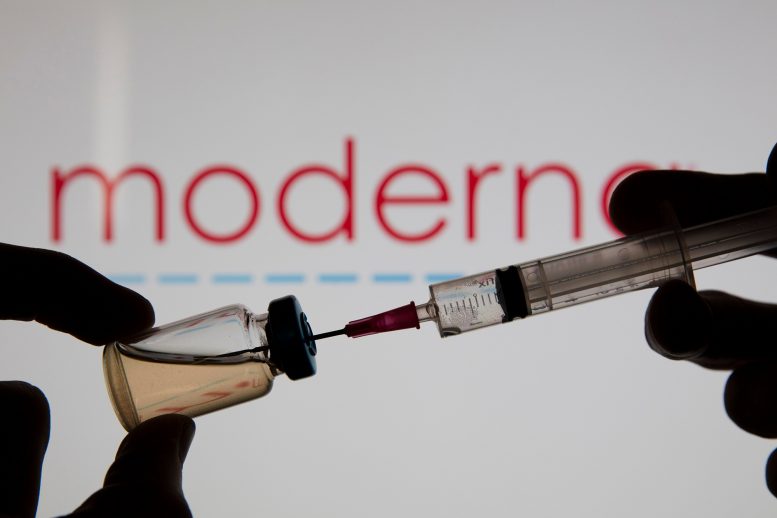
A study of older U.S. adults led by researchers at Brown University found that the risk of negative effects of both mRNA vaccines is exceptionally low, but lowest with the Moderna vaccine.
While mRNA vaccines against COVID-19 have been found to be safe and effective for the general population, in-depth evidence about safety and effectiveness for older adults and individuals with chronic health conditions is more limited.
To address this gap, researchers led by Brown University conducted a comparison study of the two mRNA vaccines approved by the U.S. Food and Drug Administration — the Moderna and Pfizer-BioNTech vaccines. The results, published on August 2 in JAMA Network Open, showed that for older adults, the Moderna vaccine was associated with a slightly lower risk of adverse events than the Pfizer-BioNTech vaccine.
“The results of this study can help public health experts weigh which mRNA vaccine might be preferred for older adults and older subgroups, such as those with increased frailty,” said lead study author Daniel Harris, an epidemiologist and research scientist in the Center for Gerontology and Healthcare Research at the Brown University School of Public Health.
Vaccines and Older Adults
The study involved more than six million older adults, with an average age of 76 years, who received one of the two COVID-19 mRNA vaccines, Moderna and Pfizer-BioNTech. These vaccines have subtle differences in manufacturing, administration, and immune response. The study confirmed that the risk of serious adverse events for older adults in both vaccine groups was very low.
Comparative Analysis
Additionally, the researchers observed that for these older adults, the Moderna vaccine was associated with a 4% lower risk of pulmonary embolism, which is a sudden blockage in blood vessels of the lungs, and a 2% lower risk of thromboembolic events, defined as several conditions related to blood clotting.
The Moderna vaccine was also associated with a 15% lower risk of diagnosed COVID-19 compared to the Pfizer-BioNTech vaccine.
Key Considerations
Harris emphasized that the risk of adverse events from a natural infection with SARS-CoV-2, the virus that causes COVID-19, is substantially higher than the risk of adverse events from either mRNA vaccine. But now that over 70% of the global population has received one type of COVID-19 vaccine and vaccine supply is less of a concern, he said there is a need for detailed information about vaccine effects and safety to guide decision-making.
“Immunization with either mRNA vaccine is substantially better and safer than not being vaccinated at all,” Harris said. “But in an ideal world where we can have a choice between which vaccine product is used, we wanted to see whether one vaccine was associated with better performance for older adults and those with increased frailty.”
Harris said there is also a need to understand vaccine performance in real-world populations. He noted that older adults, who often have chronic health conditions, tend to be excluded from clinical trials or represented in small numbers. This is especially important considering that older adults, especially those in nursing homes, had a higher risk of developing severe COVID-19. Older adults with frailty can also have differences in their immune responses to vaccines, Harris said, making it important to understand how these vaccines work for frail older adults compared to their non-frail counterparts.
Collaboration and Real-world Data
This research was part of a project called the IMPACT Collaboratory, led by researchers at Brown University and Boston-based Hebrew SeniorLife, which is enabling massive monitoring of the long-term safety and effectiveness of COVID-19 vaccines for Medicare beneficiaries, in collaboration with CVS and Walgreens pharmacies.
“Because we had these real-world data and a cohort that included millions of older adults, we were able to tease apart potentially very small differences in vaccine safety and effectiveness and perform analyses on important clinical subgroups,” Harris said.
Conclusions and Recommendations
According to the research team, the improved safety of the Moderna vaccine for some adverse events, like pulmonary embolism, could have been due to its greater protection against COVID-19, especially for non-frail older adults.
“We think that these two things, safety, and effectiveness, are interrelated,” Harris said. “The slightly reduced risk of pulmonary embolism and other adverse events that we saw in individuals who received Moderna may be because the Moderna vaccine was also more effective at reducing COVID-19 risk.”
However, the study was unable to definitively conclude whether the differences in adverse events were due to safety or effectiveness, and the researchers recommended additional research in this area. The study also only looked at the first dose of the mRNA vaccines, so another potential next step could involve similar comparisons for subsequent vaccinations.
“You can imagine regularly updating these types of analyses as new vaccines are developed,” Harris said. “Depending on which one comes out on top, even on a very small scale, that may have big implications at the population level and render a preference for that particular vaccine.”
Reference: “Comparative Risks of Potential Adverse Events Following COVID-19 mRNA Vaccination Among Older US Adults” by Daniel A. Harris, PhD; Kaleen N. Hayes, PhD; Andrew R. Zullo, PhD; Vincent Mor, PhD; Preeti Chachlani, MA; Yalin Deng, PharmD; Ellen P. McCarthy, PhD; Djeneba Audrey Djibo, PhD; Cheryl N. McMahill-Walraven, PhD and Stefan Gravenstein, MD, 2 August 2023, JAMA Network Open.
DOI: 10.1001/jamanetworkopen.2023.26852
Additional Brown University collaborators included Kaley Hayes, Andrew R. Zullo, Vincent Mor, Preeti Chachlani, Yalin Deng and Stefan Gravenstein.
The work was supported by the National Institute on Aging of the National Institutes of Health under award number U54AG063546, which funds NIA Imbedded Pragmatic Alzheimer’s Disease and AD-Related Dementias Clinical Trials Collaboratory (the NIA IMPACT Collaboratory). Supplemental funding was provided under grant numbers 4193U54AG063546-S07 and 3U54AG063546-S08.